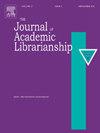AILIS 1.0: A new framework to measure AI literacy in library and information science (LIS)
IF 2.3
3区 管理学
Q2 INFORMATION SCIENCE & LIBRARY SCIENCE
引用次数: 0
Abstract
As artificial intelligence (AI) becomes more embedded in academic and professional settings, assessing and improving AI literacy among current and future information professionals is increasingly important. However, research in this area within Library and Information Science (LIS) remains exploratory, and more evidence is needed to guide training and curriculum design. This study assesses AI literacy among LIS students and librarians, highlighting key areas and groups for targeted training.
To this end, the AILIS 1.0 questionnaire was developed from existing AI literacy tools in higher education and adapted to the LIS context with expert input. It was administered to 163 respondents at the Complutense University of Madrid (Spain). Descriptive statistics and non-parametric tests were used to examine gender and group differences. To further validate the findings, three focus groups with LIS undergraduates were conducted.
Functioning, Ethics, and Evaluation emerged as core dimensions of AI literacy. Functioning scores correlated strongly with all other dimensions except self-assessed Usage. Overall, library professionals outperformed students, particularly in Ethics and Usage. However, students, especially first-years, reported higher self-efficacy despite lower performance, indicating a tendency to overestimate their AI literacy, as confirmed by focus groups.
The research underscores the need for educational strategies in AI literacy and greater involvement of educators and professionals. The higher AI literacy shown by librarians should encourage professionals to take more active roles in AI literacy training. Finally, results highlight the potential of AILIS 1.0 as a diagnostic tool, but also as a framework to evaluate AI literacy within LIS.
AILIS 1.0:衡量图书馆与信息科学(LIS)领域人工智能素养的新框架
随着人工智能(AI)越来越多地融入学术和专业环境,评估和提高当前和未来信息专业人员的人工智能素养变得越来越重要。然而,图书馆与信息科学(LIS)在这一领域的研究仍处于探索阶段,需要更多的证据来指导培训和课程设计。本研究评估了LIS学生和图书馆员的人工智能素养,突出了有针对性培训的关键领域和群体。为此,AILIS 1.0调查问卷是根据高等教育中现有的人工智能素养工具开发的,并在专家的意见下适应了LIS的背景。对马德里康普顿斯大学(西班牙)的163名受访者进行了调查。采用描述性统计和非参数检验来检验性别和群体差异。为了进一步验证研究结果,我们对LIS本科生进行了三个焦点小组的研究。功能、伦理和评估成为人工智能素养的核心维度。功能得分与除自我评估使用率外的所有其他维度都有很强的相关性。总体而言,图书馆专业人员的表现优于学生,尤其是在道德和使用方面。然而,正如焦点小组所证实的那样,学生,尤其是一年级学生,尽管表现不佳,但自我效能感却更高,这表明他们倾向于高估自己的人工智能素养。该研究强调了人工智能素养教育战略的必要性,以及教育工作者和专业人士更多参与的必要性。图书馆员表现出的更高的人工智能素养,应该鼓励专业人员在人工智能素养培训中发挥更积极的作用。最后,结果强调了AILIS 1.0作为诊断工具的潜力,但也可以作为评估LIS内人工智能素养的框架。
本文章由计算机程序翻译,如有差异,请以英文原文为准。
求助全文
约1分钟内获得全文
求助全文
来源期刊

Journal of Academic Librarianship
INFORMATION SCIENCE & LIBRARY SCIENCE-
CiteScore
5.30
自引率
15.40%
发文量
120
审稿时长
29 days
期刊介绍:
The Journal of Academic Librarianship, an international and refereed journal, publishes articles that focus on problems and issues germane to college and university libraries. JAL provides a forum for authors to present research findings and, where applicable, their practical applications and significance; analyze policies, practices, issues, and trends; speculate about the future of academic librarianship; present analytical bibliographic essays and philosophical treatises. JAL also brings to the attention of its readers information about hundreds of new and recently published books in library and information science, management, scholarly communication, and higher education. JAL, in addition, covers management and discipline-based software and information policy developments.
 求助内容:
求助内容: 应助结果提醒方式:
应助结果提醒方式:


